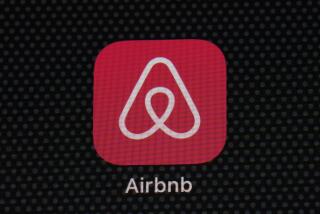Abroad, Brand Names Don’t Always Translate
“Budget Rent a Car,” the sign above the counter at the airport in Morelia, Mexico, read. “Budget Rent a Car,” the paperwork said. It also said I would pay the not-so-attractive rate of $63 a day for a compact car, plus a mandatory $15-a-day basic liability insurance, plus taxes.
But was this really Budget Rent a Car? When the paperwork was done, the agent led me to a compact car in the parking lot, handed over the keys and asked whether I had any questions. I looked at the dashboard indicators and said, “Why is there no gas in this car?”
“That’s normal,” the agent replied as my blood pressure began to climb. “Most people buy gas at the station two kilometers up the road. Don’t worry. It works out just like a rental car with a full tank in the U.S. We expect you to return it empty.”
A fine system. In effect, this sales agent was encouraging me to drive around rural Mexico on a nearly empty tank. And every drop of gas in the tank when I returned the car would be my gift to Budget. This didn’t sound like something Budget would do in the U.S.
We Americans often pay a pretty penny for the comfort of a familiar brand name in a foreign land. As more businesses go global, we see an increasing number of well-known names in far-off lands. But a familiar brand name doesn’t guarantee that the product or service will be the same.
Sometimes this is simply a matter of local culture overwhelming corporate culture. But these variations also can be rooted in business relationships. In some cases, the foreign version of Brand X is actually owned by Magnate Y, but Y has hired X to manage the enterprise. (That’s often the case with hotels.) In other cases, Brand X extends its reach by selling franchises, giving franchisees like Magnate Y the chance to use the beloved Brand X name in exchange for money and a pledge that Y will meet X’s standards. (How strictly are those standards enforced? Every company chooses its own way.)
In still other cases, consumers may admire Brand X because of their experience with its product, without realizing the broader nature of the enterprise. The words “Best Western,” for instance, bring comfort to many a traveler. But how many customers realize that Best Western is really a Phoenix-based nonprofit corporation that’s a marketing entity and doesn’t own or manage a single hotel? To join, individual hotel owners pay fees and agree to uphold common standards. In exchange, they get the right to put those two familiar words on their signs.
Thus, those Best Western standards tend to bend more than do the standards at Hilton or Hyatt or Sheraton. Best Western officials say most of their more than 4,000 hotels worldwide get three-star ratings (of a possible five) from independent evaluators, but some earn four and some squeeze by with two. If you don’t do homework first, you may find a surprise at check-in.
And sometimes, as with my Budget car, even doing homework doesn’t protect you.
Here’s how that Mexican surprise worked out: Faced with little choice, I took the car, bought gas and promised myself I’d either return the car with only fumes in the tank or demand that they siphon out my leftover gas for me. But as usual, I ran low on time, and dropped off the car in a hurry, with half a tank of gas.
When I was stateside again, I called Budget’s toll-free number and, speaking as an anonymous customer, asked a reservations agent whether a rental car in Morelia would come with gasoline.
Agent: “A full tank. And if you return it with less than a full tank, you must pay for gas to refill it.”
Reynolds: “Are you sure?”
Agent: “Yes.”
Worldwide, Budget has 3,200 locations in 120 countries. Budget Group Inc., parent company of Budget Rent a Car, reported operating losses of nearly $84 million in the first half of 2001, and in May the company announced a major reorganization. Among the changes, all but a dozen of the 300 Budget rental car sites in Britain and France would henceforth be operated by franchisees, not by the corporation. That arrangement, Budget officials said, would better insulate Budget from financial risk. All of Budget’s 117 Mexico outlets, including the one at the Morelia airport, were already franchise arrangements.
Much of this I learned from the Budget Internet site (https://www.budget.com). Then I called Budget’s corporate offices in Lisle, Ill., to ask about the gap between what I saw in Mexico and what the agent told me by phone. Spokeswoman Jenny Sullivan said that the empty-tank gambit “is not standard procedure in any of our locations. We do our best to enforce our policies in other countries, to make customers’ experiences positive....That shouldn’t have happened.”
The point here is not to pass judgment on Budget. Certainly Budget isn’t the only international rental car company to occasionally serve up surprises in Mexico. A few years ago, a Times photographer and I reserved a car from Dollar Rent a Car in Guadalajara and found it had about 33,000 miles on its odometer and only fumes in the tank. On the way to the gas station, we discovered that the air-conditioning didn’t work. These things happen, and sometimes the best you can do is look closely at the car when you’re on the scene and register your dissatisfaction.
Also, remember that a foreign franchise’s deviation from stateside policy can be an advantage. For instance, if you’re in Morelia and you want a compact-car price that’s 30% lower than I paid and you’re willing to give up some comfort, the Budget people there will rent you a car with manual transmission and no air-conditioning. Those are penny-pinching attributes seen rarely, if ever, in U.S. rental car lots these days.
Hotels can bring pleasant brand-name surprises too. The nicest Holiday Inn I’ve ever seen was the one in Chongqing, China (better known to many Americans as Chungking), where I landed at the end of a Yangtze River cruise several years ago. Most of Chongqing seemed grimy and smog-choked. The hotel was 21 stories with six restaurants, a lobby full of marble floors and walls, a gift shop full of fine ceramics--so much more than I would ever expect from a Holiday Inn in the U.S.
*
Christopher Reynolds welcomes suggestions, but he cannot respond to letters and telephone calls. Address comments to Travel Insider, Los Angeles Times, 202 W. 1st St., Los Angeles, CA 90012; e-mail [email protected].
More to Read
Inside the business of entertainment
The Wide Shot brings you news, analysis and insights on everything from streaming wars to production — and what it all means for the future.
You may occasionally receive promotional content from the Los Angeles Times.











